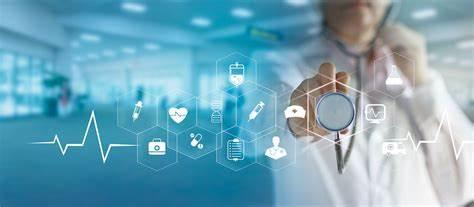How Healthcare Software Development Works in 2024

The healthcare landscape is undergoing a digital revolution. Patients are demanding more control over their health data, and medical professionals are seeking innovative tools to improve efficiency and patient care. This is where healthcare software development companies step in, acting as the architects of the future of medicine.
A Patient-Centric Approach
In 2024, healthcare software development services isn't just about building apps or electronic health records (EHRs). It's about creating a patient-centric ecosystem. This means developing software that empowers patients to:
- Manage their health: User-friendly apps allow patients to track symptoms, monitor chronic conditions, access test results, and schedule appointments.
- Connect with healthcare providers: Secure messaging platforms facilitate communication between patients and doctors, fostering better care coordination and medication adherence.
- Access personalized medicine: Advanced analytics can personalize treatment plans based on a patient's unique medical history and genetic data.
Security and Privacy at the Forefront
As healthcare software deals with sensitive patient information, security and privacy are paramount. Here's how healthcare software development companies prioritize these aspects:
- Compliance with Regulations: HIPAA (Health Insurance Portability and Accountability Act) compliance remains a top priority, ensuring patient data is protected by robust security measures.
- Data Encryption: Data is encrypted at rest and in transit, minimizing the risk of breaches.
- Multi-factor Authentication: Secure login protocols with multi-factor authentication prevent unauthorized access to patient information.
- Focus on Transparency: Patients have the right to know how their data is used. Clear and concise privacy policies ensure patients understand how their information is protected.
AI and Machine Learning: Powering Innovation
Artificial intelligence (AI) and machine learning (ML) are no longer futuristic concepts in healthcare software development. Here are some ways AI and ML are transforming the industry:
- Clinical Decision Support: AI algorithms can analyze patient data and medical literature to assist healthcare providers in making informed diagnoses and treatment decisions.
- Personalized Medicine: ML can analyze vast datasets to identify patterns and predict individual health risks, allowing for preventive care and targeted treatment plans.
- Virtual Assistants and Chatbots: AI-powered virtual assistants can answer patient questions, schedule appointments, and provide basic medical advice, reducing the burden on healthcare providers.
- Medical Image Analysis: AI can analyze medical images like X-rays and MRIs with high accuracy, assisting doctors in early detection of diseases.
The Development Process: Collaboration is Key
Developing healthcare software requires close collaboration between various stakeholders:
- Software Developers: Skilled programmers create the software using secure coding practices and adhering to industry best practices.
- Healthcare Professionals: Doctors, nurses, and other healthcare workers provide valuable insights into patient needs and workflows, ensuring software solutions are practical and user-friendly.
- Data Scientists: These experts analyze patient data and medical records to identify trends and develop algorithms for AI and ML integration.
- Security Experts: They ensure the software is built with robust security measures and adheres to data privacy regulations.
The Road Ahead: Continuous Learning and Improvement
Healthcare software development is an ever-evolving field. Here are some key trends for the future:
- Interoperability: Software will become increasingly interoperable, allowing data to flow seamlessly between different healthcare systems, facilitating better coordinated care.
- Telehealth and Remote Monitoring: The use of telehealth and remote patient monitoring tools will continue to rise, providing greater accessibility and convenience for patients.
- Wearable Devices and the Internet of Medical Things (IoMT): Integration with wearable devices and IoMT technology will allow for real-time patient data collection and monitoring, leading to more personalized and preventative care.
Conclusion
Healthcare software development companies in 2024 are at the forefront of a technological revolution that is transforming how we deliver and experience healthcare. By prioritizing patient needs, security, and innovation, these companies are paving the way for a future where technology empowers both patients and healthcare professionals to achieve better health outcomes.
To know more about this read this amazing healthcare blog about healthcare software development in 2024!
- Questions and Answers
- Opinion
- Motivational and Inspiring Story
- Technology
- Live and Let live
- Focus
- Geopolitics
- Military-Arms/Equipment
- Beveiliging
- Economy
- Beasts of Nations
- Machine Tools-The “Mother Industry”
- Art
- Causes
- Crafts
- Dance
- Drinks
- Film/Movie
- Fitness
- Food
- Spellen
- Gardening
- Health
- Home
- Literature
- Music
- Networking
- Other
- Party
- Religion
- Shopping
- Sports
- Theater
- Health and Wellness
- News
- Culture

